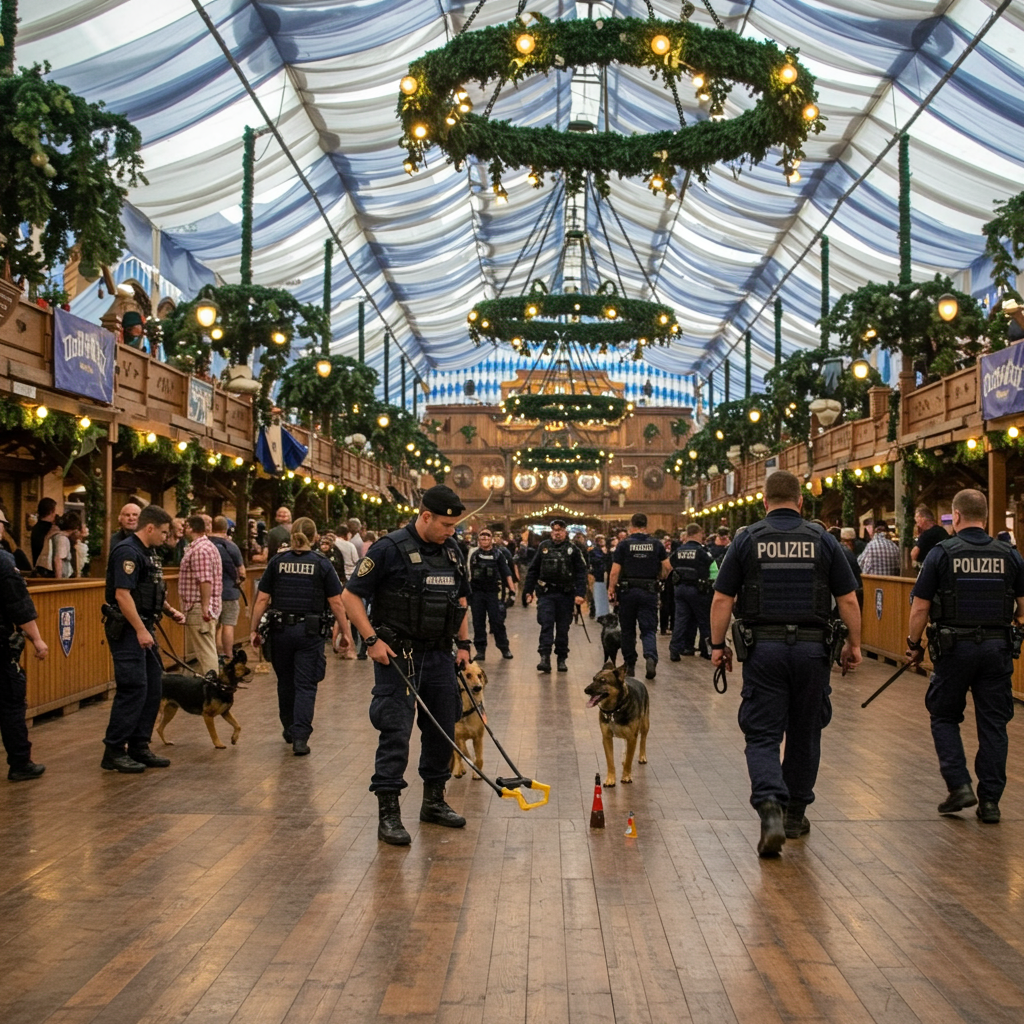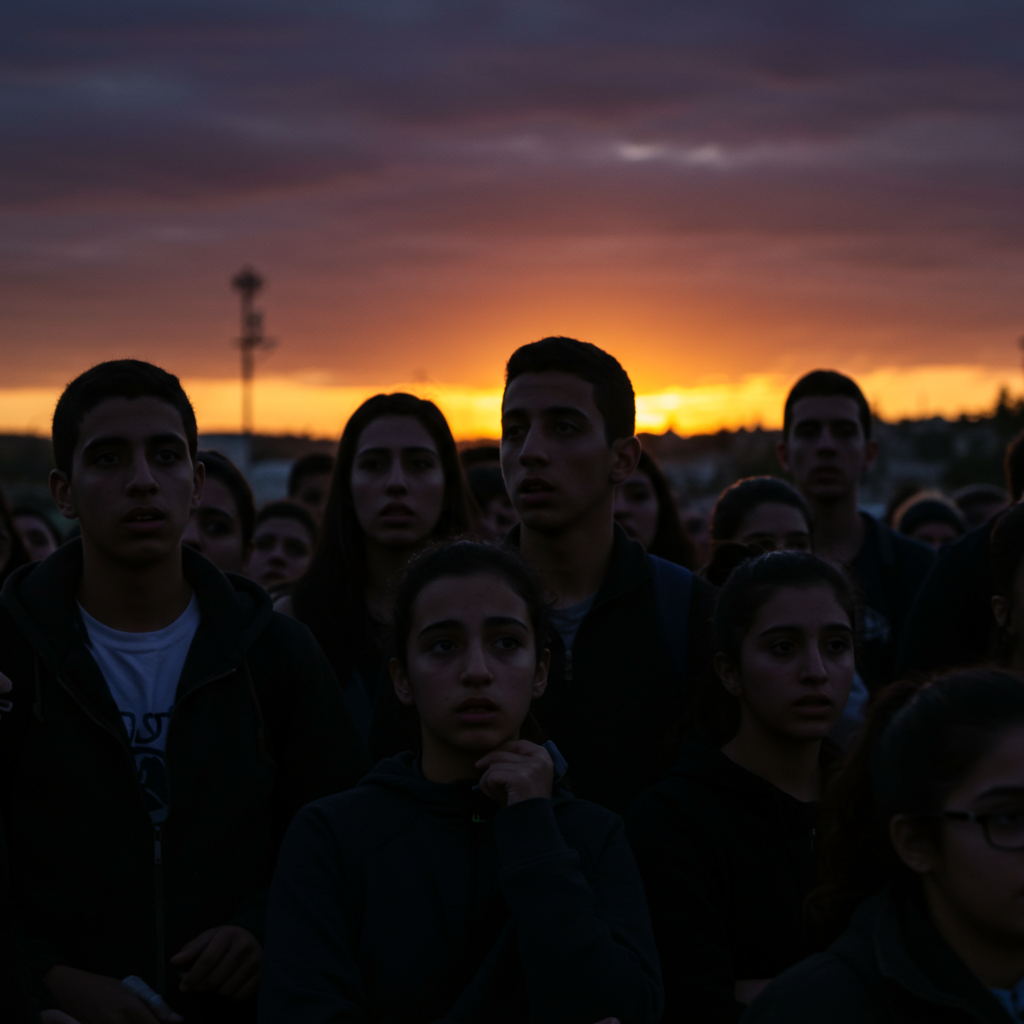Munich’s world-renowned Oktoberfest, an annual celebration drawing millions, faced an unprecedented security alert on October 1, 2025, when it was temporarily closed following a bomb threat. This alarming situation stemmed from a tragic family dispute that unfolded earlier in northern Munich, involving a deadly house fire, explosions, and a suspect found with an explosive device. While the festival grounds at Theresienwiese were swept by police and explosive detection dogs, authorities swiftly worked to contain the threat. By late afternoon, public safety was confirmed, allowing the beloved festival to resume its operations. This incident highlighted the critical importance of rapid response and vigilance in safeguarding major public events.
The Unfolding Crisis: A Morning in Munich
The day began not with the usual sounds of joyous festivities but with emergency sirens piercing the early morning calm in Munich’s northern Lerchenau district. At approximately 4:45 a.m., police and fire services converged on a residential area after reports of a house fire, explosions, and even gunfire. What started as a domestic incident quickly escalated into a city-wide security concern, ultimately impacting the Oktoberfest.
Tragic Origins: A Family Dispute Ignites
At the heart of the crisis was a 57-year-old German man, whose violent actions ignited the chain of events. Police believe he intentionally set his family home ablaze amid a long-standing and bitter family dispute. Early investigations suggested the conflict centered around inheritance issues and the suspect’s paternity of his 21-year-old daughter. The fire tragically claimed the life of the suspect’s father, whose body was initially unreachable due to the intense heat. His 81-year-old mother and German-Brazilian daughter were both found injured, requiring hospitalization. Authorities later confirmed that the residence had been booby-trapped with explosives, complicating the initial emergency response. A Mercedes Sprinter van, confirmed to belong to the suspect, was also found engulfed in flames nearby, reportedly due to explosives.
Explosive Discoveries and Swift Police Response
The suspect fled the scene, sparking an immediate manhunt involving police helicopters and ground units. He was eventually cornered near Lerchenauer See lake, where he tragically took his own life using a homemade weapon. A critical discovery was made during his apprehension: a backpack containing an explosive device, which required immediate defusal by special forces. This find, coupled with the booby-trapped house, underscored the gravity of the situation. Over 500 officers were mobilized in a massive security operation, demonstrating the Bavarian police’s commitment to containing the threat and ensuring public safety.
Oktoberfest Under Threat: Precautionary Closure
As the details of the Lerchenau incident emerged, an even more alarming connection became clear. Investigators found a note written by the suspect, containing an “unspecified threat of explosives” specifically directed at Oktoberfest. Given the festival’s immense scale and public nature, this discovery mandated an immediate and decisive response from authorities.
The Critical Link: A Suspect’s Dire Warning
The timing of the threat was particularly conspicuous, just hours before Oktoberfest was scheduled to open for the day. Bavarian Interior Minister Joachim Herrmann and Munich police officials made the crucial decision to temporarily close the Theresienwiese, the sprawling public space where the festival is held. This was a precautionary measure, not an admission of a confirmed device at the festival, but a necessary step to ensure the safety of millions of potential visitors. Munich Police Deputy President Christian Huber emphasized that the closure allowed explosives experts and specialist canine units to conduct an exhaustive sweep of the site, extending beyond the routine daily checks of the large tents. This preemptive action prevented the logistical nightmare of evacuating thousands of attendees had the festival already opened.
Festival Grounds: A Scene of Intensive Searches
With the festival gates shut, the Theresienwiese transformed from a bustling carnival into a high-security zone. Nearly 30 sniffer dogs from across Bavaria, trained to detect explosives, meticulously combed the vast fairgrounds. Special forces were also on standby, prepared to address any potential threats. Police spokesperson Thomas Schelshorn confirmed the “major operation” and the cordon around the Theresienwiese, explaining that search measures were implemented to thoroughly assess the “unspecified threat.” This extensive search operation aimed to definitively rule out any lingering danger before the festival could safely resume.
Reopening and Reassurance: Munich’s Resilience
After hours of intense searching and evaluation, authorities were able to provide the eagerly awaited all-clear. The threat was deemed not genuine concerning the festival itself, allowing Oktoberfest to once again welcome visitors.
All Clear: Festival Resumes Operations
Following a comprehensive sweep of the grounds, Munich police confirmed that no suspicious items related to the threat were found. The temporary closure, which lasted several hours, concluded when authorities gave the green light. Oktoberfest officially reopened at 5:30 p.m. local time on October 1, 2025, much to the relief of organizers and eager festival-goers. Munich Mayor Dieter Reiter, along with police officials, reassured the public that the immediate danger had been addressed and mitigated, allowing the world’s biggest folk festival to continue.
No Wider Threat: A Targeted, Domestic Tragedy
Bavarian Interior Minister Joachim Herrmann emphasized that preliminary investigations pointed to a family dispute as the sole motive behind the incident, dismissing any signs of political extremism or a wider plot. This clarification was crucial in easing public anxiety, confirming that the threat was isolated to the perpetrator’s personal tragedy rather than a broader security risk. Police also stated there was “no indication that other areas of Munich are in danger,” further solidifying the message of localized, contained danger. The efficient response of all emergency services was praised, with Herrmann suggesting that the suspect’s swift apprehension likely prevented further violence.
A History of Vigilance: Oktoberfest Security
The October 2025 incident, while ultimately contained, served as a stark reminder of the persistent security challenges facing major public events like Oktoberfest. The festival has a significant history of confronting threats, leading to the implementation of robust, permanent security measures over the years. Notably, a far-right extremist pipe bomb attack in 1980 tragically killed 13 people and injured over 200. Subsequent incidents, including a foiled Islamist plot in 2009 and heightened security following a mass shooting in Munich in 2016, have continually shaped and strengthened the festival’s security protocols. Today, these measures include extensive fencing, strict bag restrictions, and a heavy, visible police presence, all designed to safeguard the millions who attend annually. The swift and comprehensive response to the 2025 bomb scare reflects these ongoing efforts and the unwavering commitment of Munich authorities to public safety.
Frequently Asked Questions
What caused the temporary closure of Oktoberfest on October 1, 2025?
Oktoberfest was temporarily closed on October 1, 2025, due to a bomb threat linked to a deadly family dispute. A 57-year-old German man, involved in a house fire and explosions in northern Munich, had written a note containing an “unspecified threat of explosives” specifically directed at the festival. Authorities made the decision to close the Theresienwiese as a precautionary measure, allowing for an extensive search operation by explosives experts and canine units.
How quickly did Munich authorities respond to the Oktoberfest threat?
Munich authorities responded with remarkable speed and efficiency. The incident in Lerchenau began in the early morning hours, around 4:45 a.m. The suspect was apprehended swiftly, and the bomb threat note was discovered shortly thereafter. The decision to close Oktoberfest was made immediately, preventing any visitors from entering. By 5:30 p.m. local time, following a thorough search and confirmation of no further threat, the festival was reopened, demonstrating a rapid containment and resolution of the crisis.
What measures are in place to ensure ongoing safety at Oktoberfest?
Oktoberfest employs extensive and permanent security measures to ensure public safety, continuously adapting them in response to past incidents and ongoing threats. These include robust perimeter fencing, strict bag size restrictions, and a significant, visible police presence throughout the festival grounds. Highly trained explosive detection dogs and special forces are always on standby. The coordinated efforts of emergency services and regular comprehensive security sweeps are standard procedure, reflecting Munich’s unwavering commitment to protecting its millions of visitors.
Conclusion: Prioritizing Public Safety at Global Events
The temporary closure of Oktoberfest on October 1, 2025, served as a powerful reminder of the complex challenges involved in securing large-scale public events. While the incident stemmed from a deeply personal tragedy, the rapid and coordinated response by Munich authorities ensured that a domestic dispute did not escalate into a wider public catastrophe. Their decisive actions, from closing the festival preemptively to conducting thorough sweeps and communicating clearly with the public, upheld their commitment to safety. This event underscores the critical role of vigilance, preparedness, and seamless collaboration among emergency services in protecting vibrant cultural celebrations like Oktoberfest, ensuring they remain safe spaces for joy and community.



